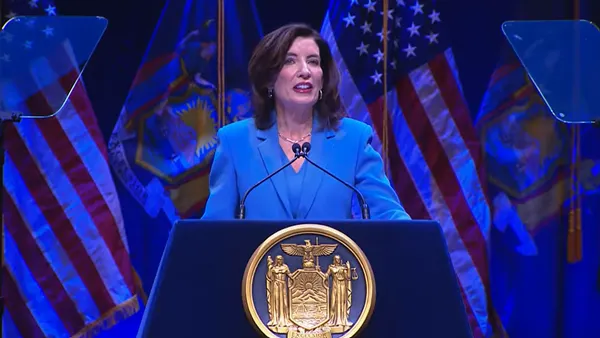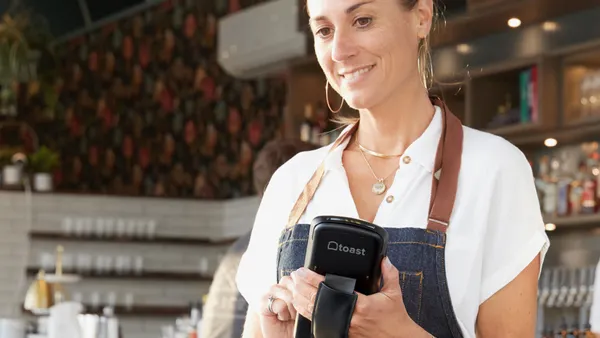Dive Brief:
- Almost half of U.S. adults who use buy now, pay later products have experienced at least one financial problem, according to results of a survey from the consumer financial services company Bankrate and the market research firm YouGov published May 5.
- Bankrate and YouGov surveyed 2,354 U.S. adults between March 19 and 21. Of those who participated, about 30% said they had used at least one buy now, pay later service.
- Of those who used BNPL services, 49% of those surveyed reported at least one financial issue: 24% said they outspent their budget, 16% noted missing a bill payment after making a BNPL purchase, 15% regretted a BNPL purchase and 14% said they had a problem with a refund or a return.
Dive Insight:
Buy now, pay later companies such as Klarna and Affirm offer services that let consumers buy a product or services and spread the cost over several payments, usually in four bi-weekly installments. Typically, they market these services as interest-free.
“People find this a valuable payment method to spread out their cash flow,” said Ted Rossman, senior industry analyst for Bankrate. “The problem is if you overdo it and you lose sight of how much you spent.”
He compared BNPL to credit cards, which can be helpful or harmful, depending on how they are used, but added that buy now, pay later services are not yet part of a consumer's credit history.
The Consumer Financial Protection Bureau last May issued an interpretive rule that would have treated buy now, pay later purchases like credit card transactions. The agency under new acting director Russ Vought reversed course a week ago, saying in an online post that it buy now, pay later enforcement would not be a priority under the new administration.
Bankrate and YouGov's survey found that young people are more likely to use BNPL than older consumers, a notion borne out by previous surveys.
Of the members of Gen Z — 18 to 28 years old — who participated in the survey, 38% said they had used BNPL, compared with 37% of millennials — 29 to 44 years old — 29% of Gen Xers — 45 to 60 years old — and 21% of baby boomers — 61 to 79 years old. Members of Gen Z were by far the most likely to say they had experienced a problem with buy now, pay later services, with 66% saying they had some kind of financial issue.
Spokespeople for buy now, pay later companies said they offer a vital service and their internal data shows delinquencies are low. Affirm’s third quarter shareholder letter, for example, said just 2.4% of users were 30 days delinquent or more on a payment.
“There are no late fees or hidden charges with Affirm and we have zero business benefit to extending access to credit that is not repaid,” an Affirm spokesperson said in an emailed statement. “We’ve demonstrated our ability to drive positive credit outcomes and we have consistently lower delinquencies than other credit issuers.”
Taking out multiple buy now, pay later services at a time is among the biggest warning signs, Rossman said, because BNPL is used most frequently by financially vulnerable populations such as the working class and young people. A recent survey shows that more people are using the service on necessities such as groceries.
“That's concerning because it shows how close to the edge people are,” he said. “Two-thirds of households live paycheck-to-paycheck and this feels like robbing Peter to pay Paul. If you don’t have grocery money [and need to use BNPL] then what about the next grocery bill?”
Buy now, pay later companies sometimes position their product as an alternative to credit cards, but Rossman noted that BNPL purchases are looking more like credit card transactions recently. “They’re lasting longer and charging interest,” he said.
In addition to their interest-free services, BNPL providers also offer short-term loans that do charge interest.














